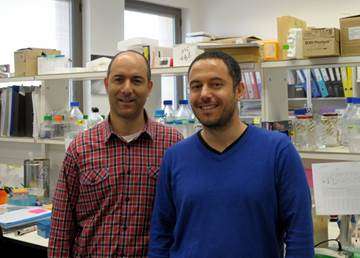How tumors become resistant to drugs, and how process can be reversed to inhibit cancer growth

Researchers at the Hebrew University of Jerusalem's Faculty of Medicine have discovered a process whereby tumor cells become resistant to specific drugs, a finding that could significantly influence how anti-cancer drugs are administered and the development of a means for reversing the proliferation of malignant tumor growth.
Cancer has become one of the major challenges of biomedical research in the past decades, and is one of the leading causes of illness and death all over the world. While many drugs have been developed against cancer, doctors do not know in advance of treatment whether a patient might benefit from a particular drug. Thus, being able to identify in laboratory testing whether a patient's tumor is either resistant or sensitive to a specific drug is crucial to enabling the rapidly developing field of "personalized medicine."
In a study published in the journal Cell Reports, conducted by Hebrew University graduate student Avi Maimon under the supervision of Dr. Rotem Karni of the Institute for Medical Research Israel-Canada at the Hebrew University of Jerusalem's Faculty of Medicine, researchers found that breast, lung and colon cancer cells change the structure of an enzyme called Mnk2, which is involved in the transmission of information from the environment/body into the cell.
The researchers showed that the enzyme Mnk2 has two forms: a "normal" form that inhibits cancer, and a form that promotes cancer development. Dr. Karni's team further showed that cancer cells change the structure of the Mnk2, so that they eliminate the form that inhibits cancer and elevate the form that induces it, thus allowing the cancer cells to survive and grow faster. In addition, the researchers found that the anti-cancer form of the enzyme activates a suicide program in normal cells under stress conditions.
To counter this process, Dr. Karni and his colleagues developed molecules that can convert the cancerous form of the Mnk2 enzyme back into its normal form, so that they become sensitive to stress and to absorbing anti-cancer drugs.
"The mechanism we discovered explains how cancer cells eliminate the anti-cancer form of Mnk2 without changing their DNA, and how they become resistant to anti-cancer treatments—a problem which exists for almost every cancer treatment today," says Dr. Karni. "The new molecules we developed in order to change the structure of the Mnk2 enzyme back to its normal form will enable re-sensitizing cancer cells into anti-cancer therapies," he says.
This research could lead to development of a new biomarker for testing the sensitivity of a patient to specific drugs. According to Dr. Karni, the possibility of examining whether a patient will benefit from a specific drug treatment before the treatment starts is of primary medical interest. His research group is now developing a diagnostic test for the marker they found.
More importantly, the molecules developed by Dr. Karni that change the cancerous form of Mnk2 into the normal form will make it possible to overcome the drug-resistance of cancer cells, making them instead sensitive and responsive to various anti-cancer treatments. Further laboratory work on this aspect is also continuing.

















